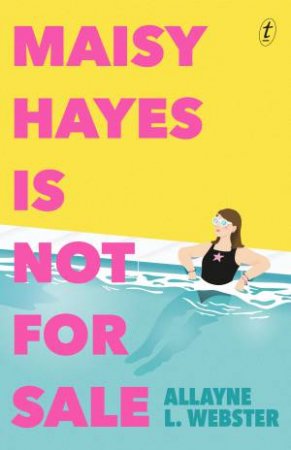Maisy Hayes is not for sale by Allayne L. Webster

Maisy Hayes is not for sale by Allayne L. Webster serves up to the reader an unflinching spotlight on the effects of poverty on a teenage girl and her family. Adelaide- based Webster grew up in rural South Australia and her books including Sensitive (an IBBY Outstanding book for Young people with Disabilities) and the CBCA notable novels Paper Planes and A cardboard palace) depict with a knowing voice, the real feelings and issues that young people have but don't talk about - not even with their closest friends. Webster goes for the nitty-gritty, raw details - for situations that are excruciating and mortifying. Young people reading her books would surely find comfort as Webster writes about what most embarrasses and humiliates. She does not shy away from the cover-ups and other efforts that people without money must go to to hide the fact that they cannot afford things that others take for granted.
Maisy Hayes cannot afford tampons. There is nothing in the fridge at home. She endlessly makes excuses for events and gatherings that she cannot attend because she does not have the money. Most of her energy is used up manufacturing a false identity, thinking of ways to climb out of poverty and above all pretending to be someone other than herself. The narrative from the first person point of view of Maisy begins in a dress shop where Maisy spots a girl..."lithe frame, dry-cleaned uniform, polished Mary Janes...teeth - neat - straight and white...skin flawless..." Maisy thinks she could be an Amelia... an Isabella. She turns out to be an Arabella... "Of course." Arabella is a prefect, she wears a private school blazer, she pouts, she eats at fancy restaurants, she can buy what she wants. Maisy wants to be an Arabella. Maisy's life is very difficult. Her mother is divorced and they live in a down and out housing trust house. Maisy has a sister with a heart condition and a younger brother. She resents her mother's slack behaviour and idolises her father who left the family a long time ago. Maisy and her sister are invited to stay with her father in his mansion in Toorak. They see how the other half live and are dazzled. But is all as it seems?
Through some shocking and confronting events, Maisy comes to reevaluate what wealth really means, to take control and responsibility over her life and to make the most of opportunities. The narrative follows a satisfying full circle.
Maisy Hayes is not for sale is a book for the contemporary teenager. It will be reassuring for readers to find that others have the same fears and worries as themselves. Webster opens the eyes of readers to the poverty hiding in plain sight in classrooms and amongst peers. There are underlying, intertwined themes including sexual abuse, stalking and prostitution in the book. The important message above all else is that all may not be as it seems and that the most important thing is to be true to yourself.
Maisy Hayes is not for sale is a very true-to-life depiction of contemporary teenage school and home life in that it reveals common and everyday concerns of teenagers. It shines a light on students experiencing poverty, on broken families and other societal issues that also impact many students' lives. While Maisy's story is particular but not exclusive to her with poverty a growing problem in Australia, other issues that she deals with are universal.
Maisy Hayes is not for sale is a compelling and thought-provoking story.
Themes: Identity, Poverty, Being true to yourself, Shame, Coming of age, Sexuality, Family breakdown, Serious illness.
Wendy Jeffrey